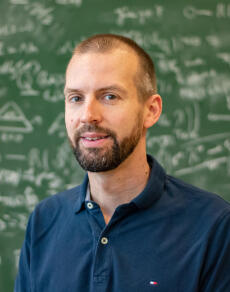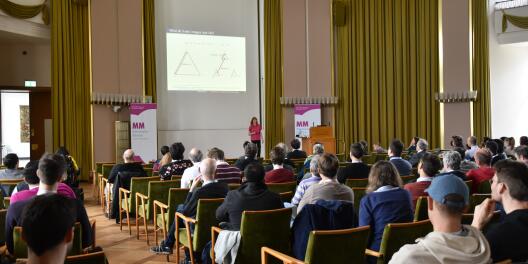Looking at the broad spectrum of mathematics

Around 200 mathematicians from all over the world will be coming together at the Schloss at the University of Münster from 25 to 27 March to discuss current developments in mathematical research. The Cluster of Excellence "Mathematics Münster: Dynamics – Geometry – Structure" will be hosting the conference. The Cluster’s spokesperson, Prof. Thomas Nikolaus, explains the special character of the conference.
Why is the Mathematics Münster Mid-Term Conference so special?
Conferences are an integral part of scientific life and are hugely important for the opportunities they offer to engage in discussions and to pursue networking. Last year we had 21 conferences at Mathematics Münster with around 1,500 participants. Mostly, though, the conferences are limited to one field of research and one mathematical community. At the Mid-Term Conference, however, we will be looking at the broad spectrum of mathematics. The talks due to be given will be presenting the latest results from a wide variety of areas – ranging from pure to applied mathematics.

Which topics will be represented?
Oscar Randal-Williams from the University of Cambridge, for example, will be speaking about the cohomology of moduli spaces – a central topic in the field of topology, and one which plays a key role in our Cluster’s research programme. The geometry of a special class of black holes will be the topic of the talk given by Mihalis Dafermos from Princeton University. Katharina Schratz from Sorbonne Université will be speaking about research being done in the field of numerical analysis, specifically about algorithms for solving wave equations – known technically as dispersive equations. All in all, we’re delighted that we could get such top-class mathematicians to come to our conference. They include many young people who have attracted international attention over the past few years as a result of the outstanding results of their work – such as Shirly Geffen, an associate professor at our Cluster.
What benefits do you expect from your approach of bringing together various branches of mathematics at the conference?
The broad range of topics reflects a basic principle which we have at our Cluster of Excellence: strong interplay between mathematical subdisciplines. Nowadays we are so specialised in mathematics that we often don’t understand one another anymore. However, if we want to solve mathematical problems of today – and, as a result, enable future breakthroughs in other disciplines – it’s important that we look beyond the confiners of our own research and work together in joint effort to develop overarching accesses and techniques. What we want to do at our conference is, on the one hand, to give the participants an overview of current topics and, on the other, to provide a framework for discussion and fruitful – and maybe unexpected – collaboration.

How will young mathematicians be involved in the conference?
We’re delighted that many PhD students and postdocs from our Cluster, as well as from other institutions, have registered to take part in the conference. At conferences like this, they have an opportunity to learn up front about the excellent research currently being done and to make contacts which may be decisive for their further research and career. A few selected junior researchers from Münster will be presenting their research projects on posters and in short talks – the so-called "poster blitz". In this way, they gain a platform for their research. At the same time, we can give our guests an insight into the range of projects which we’re working on here in Münster. For some of the talks, there will be so-called “talk tutorials” in advance, in which postdocs provide an introduction to a topic – so that everyone can easily follow the presentation. In addition, many young mathematicians are involved in organising various programme points in the conference, thus helping to make the Mid-Term Conference a fantastic joint effort on the part of the Cluster’s members.
Why is the conference actually called Mid-Term Conference?
Our Cluster of Excellence has been funded by the German Research Foundation since 2019, with the funding set to run for a period of seven years. With this conference – which is being held a little later than originally planned because of the Covid pandemic – we are drawing up an interim balance of our work and looking at the developments which have taken place in the various branches of mathematics since our Opening Colloquium. We’re all hoping of course that the follow-up proposal – which we are currently drawing up – will be successful and that as a result we can continue to develop Münster as a centre of top-level research in mathematics.
Links:
Website of the Mathematics Mid-Term Conference
Cluster of Excellence Mathematics Münster

